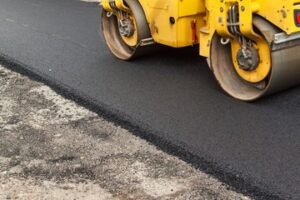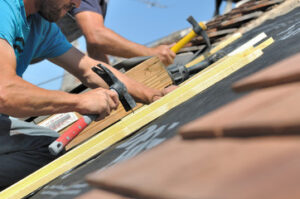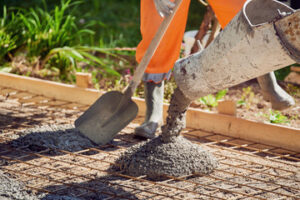Asphalt is a durable, cost-efficient, and environmentally friendly material. It is also versatile. Smooth roads reduce vehicle wear and tear and extend the life of a roadway – saving taxpayer dollars.
Asphalt pavements are built with a multi-layer process that ensures longevity. A strong but flexible base prevents cracks in the bottom layer, and a solid middle layer is then added that can last decades without needing total reconstruction. Contact Asphalt Paving Philadelphia for professional help.
Asphalt pavements are designed to be resilient, and they have a high level of fatigue resistance. This is one of the primary reasons that asphalt is a great choice for road construction and parking lots. It is also a popular material for residential driveways. However, it is important to understand that asphalt is not a “one size fits all” product. The type of material used, the thickness of the layer, the compaction process, and other factors can greatly affect longevity. A good paving contractor will be familiar with these considerations and will be willing to share information about previous projects.
While asphalt is very durable, it can be damaged by weather conditions and poor maintenance practices. In addition, the soil underneath can affect the longevity of the asphalt. For example, if the ground is loose, it can cause the pavement to shift or crack. These issues can lead to premature failure and require expensive repairs. It is crucial to hire a professional who takes these factors into account and follows best practices during the construction process.
There are several factors that influence the fatigue life of an asphalt mixture, including its composition, its temperature, and the amount of load cycles it experiences. It is important to use the right mix for each job. In order to achieve optimum durability, the asphalt should be mixed and compacted correctly. This is why many states are now specifying higher density specifications for hot-mix asphalt.
Another factor that contributes to the lifespan of an asphalt mixture is its consistency. It is important that the asphalt be consistent throughout the entire mixture, from the binder to the base course. This will help to reduce rutting, which is caused by the uneven distribution of traffic and environmental loads.
While achieving consistency can be challenging, it is possible with proper equipment and trained staff. There are many tools that can be used to monitor the quality of the asphalt during production, including handheld spectroscopic devices and x-ray fluorescence. These tools can help to detect and correct issues before they impact the quality of the pavement.
Ease of Maintenance
Asphalt is a great material for paving because it is affordable and easy to maintain. While it does require consistent maintenance, such as crack filling and sealing services, it’s much less expensive than other paving materials like concrete. It’s also recyclable, so when it reaches the end of its lifespan it can be recycled and repurposed, reducing waste and conserving resources.
Asphalt consists of aggregate materials, such as crushed rock, sand, and gravel, mixed with a sticky black oil-based substance called bitumen. The ingredients are heated to over 300 degrees Fahrenheit to make them malleable, and then they’re laid down over a prepared base. When the asphalt cools, it becomes solid and firm. It is then grooved with a broom or smoothed with a roller to create the desired texture. Finally, the surface is striped with lane lines, crosswalks, and any other necessary markings.
The durability of asphalt is one of its most significant advantages, as it provides a strong foundation for a road or parking lot, and can withstand heavy traffic loads. It also has excellent water-managing qualities, directing the runoff away from gassy areas or rerouting it to other places where it can be better managed. In addition, it has skid resistance and a dark color that helps melt snow and ice, making driving safer for both pedestrians and vehicles.
However, all asphalt eventually degrades over time. This is because the binding elements of the bitumen wear out, and the aggregates lose their binders as they shed water. It’s important to maintain your asphalt with regular maintenance and repair any problems as soon as you notice them.
While asphalt does have some disadvantages, such as temperature sensitivity, it’s still more durable than other paving materials and offers a good return on investment. If you take care of your asphalt, it should last for years before it needs to be resurfaced.
As with any paving material, it’s best to work with a professional when you need to repair your driveway or parking lot. Finding a company that has a good reputation in your area is important to ensure that the quality of their work meets or exceeds your expectations.
Low Impact on the Environment
Asphalt is infinitely recyclable and doesn’t release any harmful gases into the atmosphere during production. Furthermore, it is an incredibly green surface material. The paving industry is committed to continuously improving the sustainability of their products and processes. This is why they use the latest technology to build roads with permeable surface materials, which are a good way to prevent runoffs and water pollution.
The paving industry also uses recycled asphalt and aggregates, which reduces the need for virgin materials. The USA, for example, is the biggest recycler of asphalt, reusing approximately 65 million tons every year. Additionally, they utilize other types of recycled materials such as blast furnace slag, tires, and asphalt roofing shingles.
As a result, asphalt is more environmentally friendly than concrete, which is a non-recyclable material. When properly designed, maintained and resurfaced, asphalt pavements are capable of lasting for decades without requiring complete reconstruction. This is because it is constructed using a thick base course for bearing the main load, an intermediate (binder) course, and a 30-40 mm wearing course. When it is time to resurface, the old asphalt is milled off and reused into a new layer.
Another benefit of asphalt paving is that it allows for the natural absorption and filtration of water. This helps to prevent surface runoffs, which are a major contributor to flooding and soil erosion. By allowing water to filter through, asphalt surfaces reduce the need for costly stormwater drainage systems and contribute to groundwater recharge.
Additionally, asphalt’s porous properties help to reduce blinding spray on wet roadways and improve visibility for drivers. As a result, they can decrease the number of accidents and deaths caused by wet road conditions.
Furthermore, asphalt roads are quieter than concrete or other surfaces, which reduces noise pollution in communities. This is important because road noise can lead to hearing loss and disrupt sleep patterns, which has a negative impact on the health of citizens. Additionally, smooth roads can significantly extend a vehicle’s lifespan, thus saving money in maintenance and repair costs.
Asphalt paving is also quick and easy to install, which saves time and money for contractors and government agencies. In addition, it is less likely to require curing, which can lead to delays in traffic flow and congestion. This is why many asphalt paving projects are done at night so that the roads can be open to traffic again the next day.
Economical
Asphalt is a very economical material to use when building roads, streets and driveways. The materials cost less than concrete, and the paving process is quicker, which means that traffic can be moved on to the new road sooner. Asphalt also offers a number of environmental benefits, including saving taxpayers money through recycling.
The asphalt industry has made significant efforts to reduce the amount of waste produced during paving operations. In fact, asphalt pavements are recycled at a rate of over 300 million tons per year! The recycling process is very effective, as asphalt is a very durable material and can be recycled again and again without losing its integrity. Additionally, the asphalt industry has developed techniques for “rubblizing” existing concrete pavements, which saves taxpayers even more money while creating a much more long-lasting and strong surface.
A great many factors go into the economics of asphalt paving, and it is important to have a solid understanding of all of the relevant considerations in order to make the best decision for your situation. Some important considerations include:
In addition, asphalt requires much less energy to produce than other paving materials. In fact, it is estimated that a typical asphalt road uses about 20% less energy than a comparable concrete road. This reduced demand for energy lowers the impact on the environment and helps to improve vehicle efficiency.
Another factor is the price of asphalt, which can fluctuate significantly. This can have a considerable impact on the overall cost of a project. It is therefore essential to understand the impact of price variations and to find ways to minimize them.
The elasticity of asphalt is very useful when it comes to dealing with the stresses and strains on bridge decks, as it can be designed to deal with rapid changes in temperature. This is particularly important in areas where freezing and thawing cycles are common, as asphalt can be made to withstand these conditions effectively. In addition, asphalt can be ‘tailor-made’ for each road by adding different components to the mix, depending on the specific needs of the area. For example, a thicker base course can be used to effectively distribute loads above unbound granular layers, while an intermediate (binder) course can help to reduce rutting.
 An expert roofer is a highly skilled professional installing, repairs, and maintaining roofs.
An expert roofer is a highly skilled professional installing, repairs, and maintaining roofs.  Concrete driveways must be reset every few years due to settling, heavy rains, frost action, and vehicles. Concrete driveways require internal and external support to avoid cracking and settling. You can use steel reinforcing and a concrete base made from crushed stone to avoid these problems.
Concrete driveways must be reset every few years due to settling, heavy rains, frost action, and vehicles. Concrete driveways require internal and external support to avoid cracking and settling. You can use steel reinforcing and a concrete base made from crushed stone to avoid these problems.